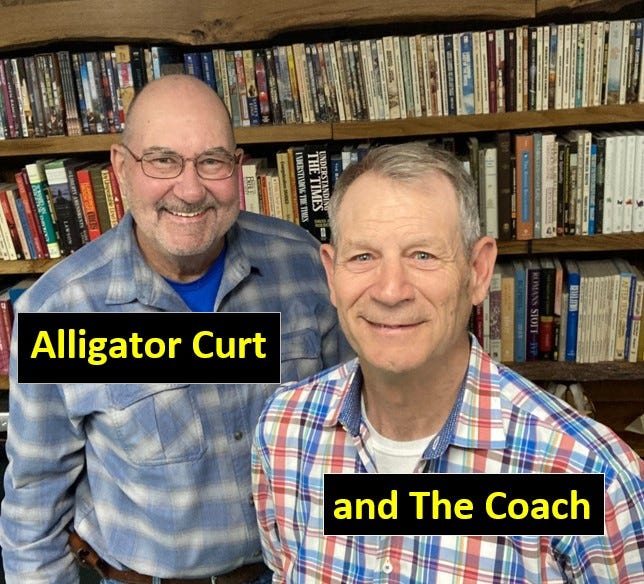“Thanks for calling Southwestern Bell, this is Curt!” My voice was as chipper as I could make it at 7:30 AM.
“You know,” drawled a dry monotone, “if we had caller ID on these old-school wireline company phones, you wouldn’t have to say all that, when it’s just me.” A brief pause. “But a nice job branding the call,” he went on. “It almost makes me feel like a valued partner.”
I sighed. “Better safe than sorry. With 4,000 customers in my new domain, it could be anybody.”
“And they only call YOU if there is a problem.”
“Exactly.” I slurped some coffee, propped the handset on my shoulder and leaned back in the swivel chair. “What’s cookin’ in the big city?”
“Managers’ meeting at 8 o’clock sharp, union grievance informal hearing at 9. Same old, same old. You?”
“Still fighting with this “excused absence” policy. Want to give me some feedback?” I leaned forward, put him on speakerphone, and opened the Word document on my desktop. “Let me close the door first,” I said, rising from the chair.
“Good idea. I have 15 minutes before I gotta run.”
Team huddle
Boyd and I were peers in a giant customer service organization serving medium-size business accounts across two states. Although we both had years of service with our company, we had arrived here by different routes. He had spent the last 15 years supervising non-management personnel in a business-office environment, which meant call-takers dealing with commercial accounts.
I, on the other hand, had operated as an outside sales rep dealing with state and local governments. It was more of a Lone Ranger kind of assignment.
Boyd had experience managing people; I had experience managing customers. He was comfortable running the groups he and I were now assigned.
I was a duck out of water.
Hence, the daily “team huddle” call at 7:30 each morning. He was gracious enough to call it a team effort, but in actuality he was coaching me in how to manage a collection of a hundred subordinates. We each had a handful of first-line supervisors interposed between the troops and our own lofty positions in our corner offices.
I had known Boyd for years and found him to be competent, honest and helpful. On previous occasions when I had shared a work problem with him, he had been willing to fully engage himself in both understanding the issues and offering solutions. Now, in this role that was new to me, the team huddle was an invaluable way to start each day.
I was a duck out of water.
As happens in close working relationships, our friendship grew into more than merely work-related issues. We shared about outside activities; family and marriage; kids and schools; birthdays; extracurriculars.
Located in separate cities, Boyd and I rarely had the opportunity for face-to-face contact. The company telephone was a life-saver and a luxury. Our working relationship was, I suspect, a model of effective teamwork.
And then, retirement
Not all my work relationships were like that, of course. That would be an unreasonable expectation and an unattainable goal. During the 4 decades of my working career, I was fortunate to have perhaps half a dozen friendships like that. Each added effectiveness to my work and richness to my outlook.
Transitioning to retirement, they all went away. I had to find replacements.
I discovered that the prospect of not having friendships directly impacted my emotional and mental health.
My life was not devoid of acquaintances, of course. But moving away from the corporate world and into the sole proprietorship domain meant that I would have to pay more attention to some of those friendships that I had let languish. Fortunately, I had a short list of names I could call on. I began to make dates for coffee, or for lunch.
Less frequently, my wife and I would schedule a restaurant dinner with another couple; spend the evening talking kids and vacations; go back to their house, or ours, for dessert.
The professionals speak up
Maintaining good relationships is not only entertaining (and offers a reason to get dressed and groomed and get out of the house) but is also important in reducing stress and promoting a sense of well-being. Robert Waldinger (Harvard psychologist) conducted a 75-year (!) longitudinal study of adult development. He concluded that "good relationships keep us happier and healthier."
Okay, really… we probably don’t have to study this for 75 years to learn that. Knowing that the “happy and healthy” thing depends in part on social support is intuitive. Although, it is nice to have a real professor validate it for us.
I discovered that the prospect of not having friendships directly impacted my emotional and mental health.
On the other hand, the absence of close friendships can lead to a whole bevy of negatives. One study found that loneliness is physically about as unhealthy as smoking a pack of cigarettes a day. In addition, isolated individuals are more likely to experience anxiety, depression, and cognitive decline.
I recoil at the thought of “cognitive decline.” It’s bad enough already… Please don’t let it get worse.
Not having meaningful relationships, say the professionals, leads to a sense of purposelessness and reduces our “emotional resilience.” And, because God made us whole persons, where body and soul are intricately intertwined, this also makes us more vulnerable to physical health challenges.
Disclaimer: The professional psych literature does NOT speculate on what God might have thinking when He made us. No surprise there. But I believe most of us who have some life experience behind us understand the very real interconnectedness of body and soul.
Focus on the friends
KNOWING the importance of friends is not the same as KEEPING them. In this arena, as in every other, we must move from intellect to action.
It is not as easy as one might suspect. I have a close friend whom I’ve known for almost 50 years. We fit together well and enjoy each other’s company. Never at a loss to know what to talk about; never an uncomfortable silence; lunch-time meetings at a cheap fast-food place are grand.
I realize I haven’t seen him almost a year.
KNOWING the importance of friends is not the same as KEEPING them.
Writing this blog has made me put an item on my calendar next week: “Call What’s-His-Name for lunch!”
Maintaining those friendships takes more initiative than work. “I’ll call him someday,” must turn into, “I called him this morning and we scheduled a meeting.”
Challenge Question
Last week, Coach Ledford offered you this, in regard to managing your physical health: List 3 healthy habits you want to establish or maintain.
This week, I urge you to consider your social health:
List the names of 4-6 persons (outside your immediate family) that you consider close friends. Identify one thing you can do with one of them this month to strengthen that relationship.
Download the Challenge Tracker, a simple (and free), one-page Adobe Acrobat file, to make your notes.
Socialization is the lubricant that makes the machinery of retirement work well. This is one of big five components of an effective and relevant retirement. Those elements are included in our Retirement Action Plan, an offering toward which we are building. Stay with us!
What does the Scripture say?
Salute Asyncritus, Phlegon, Hermas, Patrobas, Hermes, and the brethren which are with them. Salute Philologus and Julia, Nereus and his sister, and Olympas, and all the saints which are with them. Salute one another with an holy kiss.
Romans 16:14-16
I know… it seems an odd Scripture. The archaic King James term “salute” is more modernly translated as “greet.”
As part of my “The-Bible-this-year” program, I read Romans this week and was impressed once again that the Apostle spends an entire chapter listing nothing but the names of people dear to him.
There are, by my count, 33 individuals whom Paul names in these 27 verses. At the end of his career, they are all precious enough for him to include. Paul may have had a greater capacity for deep friendships than most of us have.
(Extra: The last name, almost an afterthought, barely mentioned, is a fellow named Quartus. That unusual name — like Primus, Segundus and Tertius, also noted in the New Testament — may indicate the fourth son of a slave household. I can almost hear the brethren at Rome reading the epistle, high-fiving and exulting: “Quartus! Buddy! You made the letter!”)
* * * * *
As happens with many work relationships, Boyd and I were thrown together for only a short time. After a year, he was offered a different position in a completely unrelated work group. He moved on, and we gradually lost contact. The positive impact of an effective friendship, however, has been a model to me for years.
Second Half Expo 2024
For those of you within striking distance of Oklahoma City, Coach Ledford and I will be at the Second Half Expo 2024 on Saturday morning 19 October in booth #95. Please drop by! We would love to meet you!
Second Half Expo bills itself as “Everything for the 50+ generation.” They expect 2,000 visitors at the show.
Thanks for following Your Best Retirement. Download the Challenge Tracker, and please share this with a friend.






















Share this post